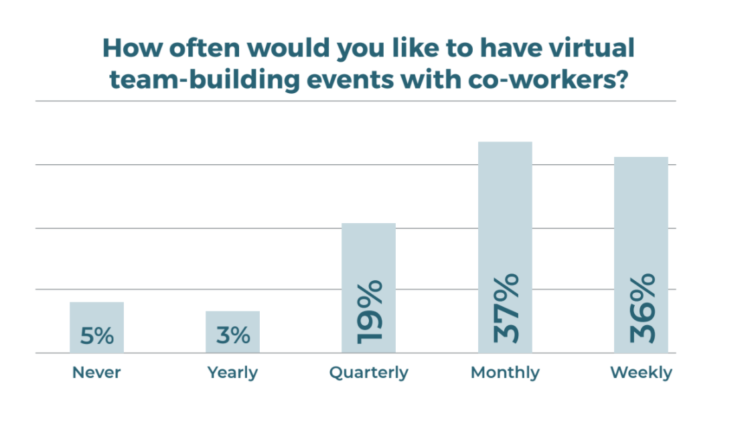Employees Want More Virtual Team-Building Events — but Skip the Zoom Happy Hours

When the pandemic hit in early 2020, the future of Emeraude Escape Rooms looked bleak at best. We were experts at putting groups of people into small rooms, which they could only leave once they solved a series of clues or their time ran out. Good for team building. Bad for social distancing.
In April, just two months into the pandemic, I decided to go all-in on digital. Like many other businesses, we had no other choice. But there was a silver lining: Demand for virtual experiences was exploding. Part of that demand came from consumers, but it was also being driven by corporations in search of creative ways to keep their employees connected and engaged in a virtual work environment.
What Employees Want From Hybrid Workplaces
In our experience, many companies now see virtual events, activities, and team-building exercises as crucial employee engagement tools. But what about employees? Do they really like these virtual events?
We wanted to know what employees were really looking for in this era of remote work, and we also wanted to uncover which digital tools — if any — were truly boosting team cohesion and filling the socialization gap. To find out, we surveyed 1,039 US workers who had started working remotely when the lockdowns began in March 2020. What we found was both surprising (employees feel more connected than ever to both colleagues and company) and enlightening (they don’t want any more Zoom happy hours, but do enjoy playing games with their peers.
Here’s a breakdown of the results :
Retention, Relationships, and Employee Engagement
The clearest takeaway from our survey is that employees want bonds with their coworkers, and they value those bonds over everything else when deciding whether to stay with a company. Sixty-six percent of the employees we surveyed said their relationships with their colleagues were among the most important factors when choosing to remain at or leave an employer. In the neverending battle to retain high-quality employees, this could be a game-changing piece of information for HR teams.

And the survey also found these relationships improve performance and increase job satisfaction. Seventy percent of workers said they tend to be more productive when they have good relationships at work, compared to just 6 percent who said they were less productive.
Employees want to feel like they are working toward a common goal with people whose company they enjoy. In the past, those bonds are formed naturally in the office setting. Today, however, virtual events play an increasingly important role in fostering connections between employees.
Employees Want More Virtual Events
Employees do appreciate virtual team-building exercises. In fact, according to the survey, they want more of them.

What they don’t want, however, are more virtual happy hours and stale Zoom meet-ups. Fifty-four percent of workers in our survey had participated in a virtual happy hour over the last year, and only 25 percent of those workers said they would prefer this type of team-building exercise in the future. On the other hand, 70 percent of workers said they would be excited to play competitive virtual games with their colleagues.

Companies need to innovate and keep things fresh for their employees. Creativity can easily stall out in a remote work environment. Stuck in routines, sitting at their desks alone, employees can quickly lose the energy to innovate. Gamification, which is especially well suited to team-building exercises, helps employees break out of those routines, reenergize themselves, and reengage with their colleagues.
Half of the employees we surveyed said adding gamification elements — like points systems, leaderboards, and multiplayer interactions — to team- and culture-building activities would help them socialize better. Plus, adding those same elements to training programs can make employees feel more empowered to learn.
Rethinking Employee Engagement for the Modern Workplace
The COVID pandemic jump-started the global remote work revolution, and there is no turning back. After a year of monotonous virtual team-building activities, it should come as little surprise that employees want opportunities to interact with each other outside of Zoom and Slack. Employers need to step up and offer their workers virtual events that bring coworkers closer together — even when those coworkers may never meet each other in real life.
The future of work is remote, and a connected workplace is key to keeping companies healthy. With the arrival of gamification in the workplace, employers may find it easier than expected to build and maintain those workplace connections.
Virgile Loisance is the CEO of Emeraude Escape.

